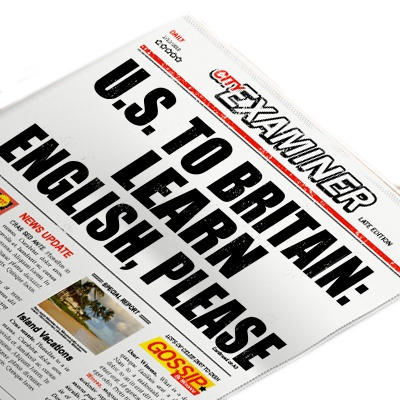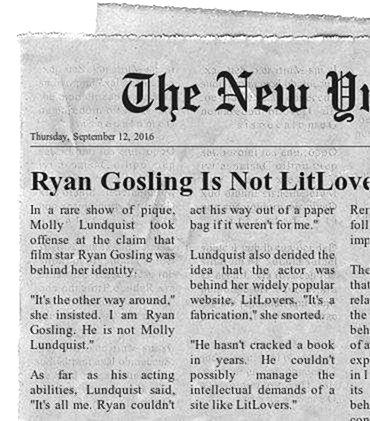 English—what a great language to have fun with! Below is a set of homophones, words that sound alike but have different meanings and often different spellings.
English—what a great language to have fun with! Below is a set of homophones, words that sound alike but have different meanings and often different spellings.
Don’t You Just ♥ Words?
peak | peek | peke | pique
He kicked her peke out of pique when she took a
quick peek before it could peak.Translation:
He kicked her dog in anger when she checked the oven
to see if his, uh...souffle had risen.
Okay. I came up with these. Let us know if you can you find others . . . or come up with some of your own. Leave a comment.
 How anyone ever learns to speak and spell English is a mystery. Below are common words that surely confound anyone—child or adult—trying to learn this quirky language.
How anyone ever learns to speak and spell English is a mystery. Below are common words that surely confound anyone—child or adult—trying to learn this quirky language.
Don’t You Just ♥ Words?
If cow rhymes with bough
shouldn’t cow rhyme with cough?If rafter rhymes with laughter
shouldn’t rafter rhyme with daughter?If hoe rhymes with toe
shouldn’t hoe rhyme with shoe?If threw sounds like through
shouldn’t threw rhyme with rough?If lime rhymes with climb
shouldn’t lime rhyme with limb?
These erratic spellings have to do with the development of the English language—which wasn’t really “English” and wasn’t really a language. From the end of the Roman occupation, the ancient Brits spoke a mishmash of Germanic and Norse tongues, with a soupcon of French and Latin throw in by the upper classes.
The language underwent constant change until the 15th century, leading to such confusion that people from one part of England could barely understand those from another.
It was William Claxton, a mid-15th century printer, who first began to consolidate and standardize what was by then "modern" English. But he started a bit too early—printing technology cemented the language before all the kinks could be worked out. Thus, the cow-bough-cough imbroglio.
 English—what a great language to have fun with! Below is a set of homophones, words that sound alike but have different meanings and often different spellings. (And, yes, I’ve taken a few liberties.)
English—what a great language to have fun with! Below is a set of homophones, words that sound alike but have different meanings and often different spellings. (And, yes, I’ve taken a few liberties.)
Don't You Just ♥ Words?
air | ayre | ere | e’re | err | heir
If e’re were a time for the heir to take air,
ere he errs in his ayre, it be now.Translation
Now is the time to take a breath before
he makes a mistake in the song.
Feel free to play along. These are mine, so see if you can find others. . . or come up with homophones of your own. It’s good brain exercise.

In what amounts to a shot across the bow of our closest ally, the U.S. fired off a threat to the U.K. This one is over our common language.
According to Secretary of State Mike Pompous, the U.S. will institute a tariff on British words—hefty enough to discourage them from reaching American shores.
The problem turns on the issue of quality.
"You invented the damn language," said Pompous. "Why can't you learn how to use it?"
The U.K.'s response was forceful but unclear. Prime Minister Theresa Maybe announced her intention to commence a "wah."
"What the hell is a "wah?" Pompous asked? "Are they going to start building a WALL or start a WAR? Even our best interpreters can't figure it out."
Statesmen aren't the only befuddled Americans. Readers, too, have long been confused by writing from across the pond.
Mary Angelica Basquirk, head of the Society of Reading Engagement (SORE), speaks for millions of U.S. readers who despair over British-isms.
"Take the words 'colour' and 'honour'—neither rhymes with 'hour.' So why do they keep the u?" she huffed. "Webster pointed this out 200 years ago, and they still don't get it."
This time it's the Brits who are ready to toss the teabags into the harbor/harbour.
"Well and good," said Hypernia Flavenburst, U.K.'s trade secretary. "No more Jane Austen for Americans. That's it. And they'll have to do without Hardy, the Brontes, and Eliot—George, that is. They can have T.S., but only because he was American."
The BBC weighed in, as well. "If Americans ever think they'll see the likes of Downton Abbey again, more's the pity," said Sir Ian Bonbon, director of licensing. "And believe me: Maggie Smith will never set foot on U.S. telly again."
Given the seriousness of Britain's response, the administration is worried about a voter backlash. A realignment is under consideration.
They'd better hurry though; the new Mary Poppins is about to open her brolly again in theaters/theatres across the country.
Cherie Belle Korteks, special to City Examiner
and LitLovers
 New York City — In a shocking move today, the book trade called for a 5-DAY READING FAST.
New York City — In a shocking move today, the book trade called for a 5-DAY READING FAST.
"We've seen the research," said Sara Reed of St. Marty's Press. "Too much reading GUNKS UP the brain. Science, you know."
"Try dumping pancake batter all over your car engine," she said. "It goops up the system so it can't work. It's like that."
The industry is woke. Readers, the experts say, need a DEEP CLEANSE—a halt to reading for 5 days.
When asked if fasting will cut into sales, Pytor Gloverloft, the owner of Kansas City's beloved TOP-SHELF BOOZE & BOOKS, believes readers will return in droves—with a renewed thirst for fiction.
"Readers need a break," he says." We predict they'll begin to read with intensified FOCUS and EMPATHY."
How should readers break their fast? "With JANE AUSTEN, of course!" says Gloverloft. "SMALL SIPS of 18th-century social satire—with a GLASS OF PORT—there's nothing better."
Cherie Belle Korteks, special to City Examiner
and LitLovers

| #MomsAreMad About Books |
||

Like wildfire |
A long history Knocking off moms goes back 300 years: to the VERY FIRST novels—at least to the 1700s with Daniel Defoe's Moll Flanders and continuing into the 1800s with Dickens's David Copperfield. The 20th century saw the likes of Anne of Green Gables and Nancy Drew—NO MOTHERS. Solve that, Nancy. Far more recent novels also lack mothers: The Curious Incident of the Dog in the Night-Time, Ahab's Wife, The Goldfinch, I Liked My Life, to name only a handful. Peters smeared Bernadette Peters, star of stage and screen, is #MAM'S most celebrated voice "I've been SMEARED. They didn't just kill me off," steamed Peters. "They turned me into a CHILD DESERTER!" |
Peters, of course, is referring to the 2012 bestseller Where'd You Go, Bernadette? "Hell, yes, it's about me!" piped Peters. "Is there any OTHER Bernadette?" Male support Fronta Loeb, special to The Daily News and LitLovers. |
 Austin, Texas: June 19, 2017 — In a surprise move today, Whole Foods and Amazon announced the takeover of LitLovers.
Austin, Texas: June 19, 2017 — In a surprise move today, Whole Foods and Amazon announced the takeover of LitLovers.
The acquisition came only days after the organic food chain was bought by Amazon.
"LitLovers fits perfectly in our shopping cart," said Biff Jezos, founder and head of Amazon. "After buying The Washington Post, then Whole Foods, LitLovers makes strategic sense."
Wall Street positively crowed. "It's the ideal combination of vertical integration and economies of scale," said Janie Diamond, head of P.J. Morgan.
When asked if it was a FRIENDLY or HOSTILE takeover, Molly Lundquist of LitLovers said …
"Biff Jeszos and I are great friends. We both know what its like to start your own business. Besides, what's hostile about $3.5 billion in the bank?"
Alongside books, LitLovers will be adding a new line of pre-cut fruits and vegetables, ideal snacks for sedentary readers. According to Ms. Lundquist …
"Research shows that reading leads to WEIGHT GAIN—I should know. Now we're offering a chance to replace those bags of chips and pints of ice cream with healthy foods. It's a winning synergy."
Cherie Belle Korteks
Special to City Examiner and LitLovers
 New York, NY: If you like your books upbeat, you're in luck. After contentious debate within the ranks, American publishers say they will no longer publish DEPRESSING books.
New York, NY: If you like your books upbeat, you're in luck. After contentious debate within the ranks, American publishers say they will no longer publish DEPRESSING books.
"Given current anxieties over everything from global politics to the migratory TEXAS FIRE ANT, we cannot pile more misery on our readership," said Barry Bundlesnorp of the American Publishing Association.
Authors disagree. "We need our readers to feel MISERABLE now more than ever," author Ann Patchup said.
"They need to learn empathy, and the only way is by subjecting them to thoroughly depressing fiction," she added. "Personally, I PROMISE to do more for the effort."
Ms. Patchup was joined in her remarks by fellow author, Filup Roth. "SUFFERING brings enlightenment," he intoned. "I generally go for SEX in my books, but suffering gets you there, too."
Those authors, however, may be bucking the wishes of their most ardent fans. While on book tour, many find themselves confronted by ANGRY READERS, waving books and demanding an end to the crush of dreary novels that have recently crowded the market.
Even reviewers, usually strong proponents of bleak literature, have joined the nay-sayers. Said Byron Shelley of The Daily News, "I've RUN OUT OF WORDS for sad—you've got dreary, dark, depressing, doleful, dismal—I've used them all. Pretty soon all you're left with is 'down in the dumps.'"
The online community has weighed in, as well. Molly Lundquist of LITLOVERS asked, "Can you think of any other consumer product specifically designed to make its users miserable? Other than TREADMILLS? Of course not."
Cherie Belle Korteks, special to City Examiner
and LitLovers.

| Government Clamps Down on Long Book Titles | ||

Dec. 12, 2016: Washington, DC— In a rare show of bi-partisanship, Congress cried foul today when the Department of Homeland Security moved to put an end to excessively long book titles. Vulnerable to hacking Disturbing trend |
Mr. Combover gave as an example Margot Lee Shetterly's Hidden Figures:Hidden Figures: The American Dream and the Untold Story of The Black Women Mathematicians Who Helped America Whoop the Soviets' Ass and Win the Space Race All the While Raising Their Children and Struggling Against Racism and the Man. Buried code "We have reason to believe there's a piece of code buried in that title," he said. "Why else would anyone write like that?" Other examples include the new biography by Julia Baird—Victoria: The Queen: An Intimate Biography of the Woman Who Became Queen at Eighteen, Loved Sex, Had Nine Children and a Fussy Husband, Yet Still Found Time to Rule a Vast Empire that Would One Day Crumble to Nothing— Further Proof (As If One Needed It) that Nothing Lasts Forever. |
Confusing Lengthy titles have dismayed those in the book business, though for different reasons. "Long titles confuse YOUNG people. They read the titles and think they've read the book," said Steve Holt of Steve Holt, Steve Holt, Inc. "Titles are longer than Twitter posts," he said, "and that's a problem." Fronta Loeb, special to The Daily News and LitLovers. |

